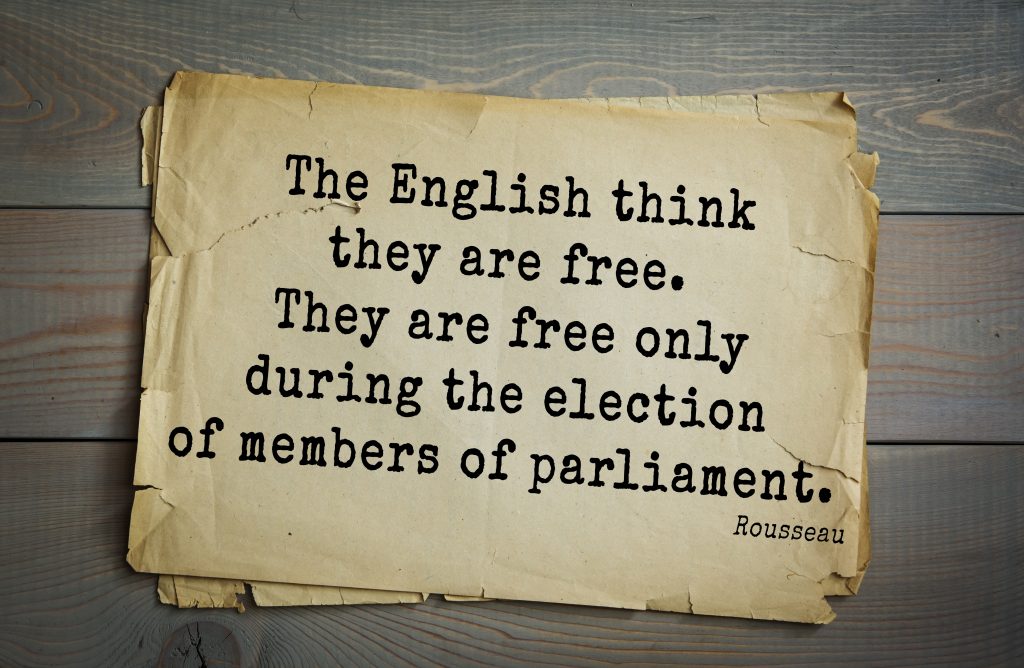Gilets Jaunes: What is the RIC?

The RIC (pronounced rick) is one of the most persistent demands of the Gilets jaunes. While their other stipulations require changes (and, I would argue, necessary changes) in fiscal policy involving taxes, unemployment insurance, retirement and other issues, the RIC (Référendum d’initiative citoyenne), or citizen-initiated referendum, is a far-reaching proposal that has profound constitutional implications–and not good ones.
We could start with Rousseau and The Social Contract.

Rousseau drew attention to the dangers of those who are now referred to as the “political class,” who achieve office and then use it to enhance their advantages and wealth. There is a straight line to be drawn from the eighteenth century insights of Rousseau to the RIC in its distrust of elected officials, the so-called “elites” who see themselves as a class above and apart from those they govern. The revolutionary sans-culottes of 1793-94, in their suspicion of those in power as well as their demands for transparency, publicity, and immediacy (in the recall of elected officials or unpopular laws) made distrust a central feature of their politics.[1]
Article 11 of the Constitution of the Fifth French Republic , which went into effect in 1958, authorized the RIP, or Référendum d’initiative présidentielle. This allows the president to submit to the public a referendum on “any Government Bill which deals with the organization of the public authorities, or with reforms relating to the economic or social policy of the Nation, and to the public services contributing thereto, or which provides for authorization to ratify a treaty which, although not contrary to the Constitution, would affect the functioning of the institutions.” [2]
The two Chambers can jointly request such an initiative, but the referendum was, and still is, under the presidential powers section, and effectively allows the president to bypass the legislature by appealing directly to the people; if the executive initiates such a measure, the president is required to inform each chamber, which then debates the measure. The RIP was supposed to deal with issues, not personalities; yet many at the time feared that such a measure, with its up or down vote on potentially complex issues, could be used as a plebiscite in favor of an individual leader.[3]
In 2015 the Référendum d’initiative partagée or “shared” initiative, introduced during the term of President Nicolas Sarkozy in 2008, came into effect. This RIP (which includes environmental policy) has never been used. It requires the support of one-fifth of all members of both Chambers (that is, 185 out of the total of 925, in both Senate and National Assembly) as well as one-tenth of all registered voters. (As of 2017, that number was just over 47,000,000.) An online petition has nine months to gather 4.7 million signatures, or one-tenth; the National Assembly and Senate then has six months to examine the referendum, and if they fail to do so, the President of the Republic submits the referendum to a popular vote. Not only does this version of RIP have many obstacles in its path, but it also seems that it could be killed in one or both houses–or to put it in another, more favorable way, the legislative function of both houses is preserved.
Though the RIC had begun circulating on Facebook and Twitter in different forms, Priscillia Ludosky and Maxime Nicolle (“Flyrider”) presented a definitive formulation on December 13 in a video that quickly went viral:
This video, a statement introducing the RIC, includes the following preamble: “This is the declaration of a people who for forty years have been dispossessed of all that would allow them to believe in their future and their greatness. For forty years, betrayal, lies, and neglect have succeeded each other–president after president, election after election.
Thus we, the Gilets jaunes, demand a lowering of all direct and sales taxes on items of necessity–energy, housing, transportation, food, clothing, etc., as well as a significant lowering of the salaries, privileges, and pensions of all elected officials and high functionaries.
In order to emerge from this urgent crisis of democracy, we want to present to the French people a concrete proposal to modify the constitution by introducing the RIC in all matters.” The four points of their proposal include:
- A RIC abrogatoire, for the annulment of a particular law;
- A RIC révocatoire, for the revocation of any elected official, up to and including the president;
- A RIC législatif, for the proposal of laws;
- And a RIC constituant, for the amendment of the constitution.[4]
Still to be determined: how many signatures would be required on a peoples’ petition; whether the referendum would be consultative (allowing the Chambers to accept or reject the proposal) or mandatory; the legitimacy of allowing the entire country to weigh in to expel a deputy from one particular constituency; whether the final bill would be again submitted for a referendum; and so on.
Asked about the subject, both Prime Minister Édouard Philippe and Emmanuel Macron have expressed serious concerns. For Philippe, the RIC has the potential for putting every vote, every decision, constantly into question; Macron suggested that one should not create a “competition” between direct and representative democracy.[5] François Bayrou of the MoDems, in alliance with Macron’s party in the Chamber, supported the partagée referendum currently on the books, perhaps amended; he suggested that the 10% of signatories among registered voters could be lowered; but he did not wish to lose the “parliamentary filter” that came from having the power to initiate the referendum.[6]
In contrast, Jean-Luc Mélenchon, head of the far left La France Insoumise (LFI) introduced a bill in the National Assembly that essentially presented the RIC as presented by the Gilets jaunes, with some minor tinkering (revocation could only occur after the elected official had served at least half his term) and with an even more sweeping constituent role: the people could pass a referendum to convoke a new constitutional convention to write a new constitution entirely, to throw out the Fifth Republic and “re-create a social contract.” His proposal was buried, with accusations from the deputies that Mélenchon was attempting to take over the movement.[7]
In 1958, many feared the presidential referendum as a cover for a plebiscite; in 2019, it can be seen as a cover for Populism. As Andrew Glencross has noted, populists like Nigel Farage or Marine Le Pen love disruption and thus love referendums: “they have the biggest incentive to bypass representative democracy. They ostensibly promote rule by the people directly as an alternative to a cartelized party politics of both the centre-left and the centre-right that allegedly ignores popular concerns.”[8] The attraction of an all-encompassing suspicion instantly elevates any disagreement over policy to “forty years of betrayal, lies, and neglect.”
If we return to Rousseau, it is worth remembering that he stated that “there has never been a true democracy, and never will be,” because of the conditions that had to be met: “First, a very small state, where the people may be readily assembled and where each citizen may easily know all the others. Secondly, a great simplicity of manners and morals, to prevent excessive business and thorny discussions. Thirdly, a large measure of equality in social rank and fortune, without which equality in rights and authority will not last long.”[9]
And Rousseau didn’t even know about Facebook and Twitter.
Header image and Rousseau image from Shutterstock.com.
[1] See the classic Albert Soboul, The Sans-Culottes, trans. by Rémy Inglis Hall (Princeton University Press, 1972; orig. ed., 1968), especially sections III and IV on popular politics.
[2] This site includes amendments to the original constitution: https://www.conseil-constitutionnel.fr/sites/default/files/as/root/bank_mm/anglais/constiution_anglais_juillet2008.pdf
[3] See Charles G. Cogan, “The Break-Up: General de Gaulle’s Separation from Power,” Journal of Contemporary History, vol. 27, No. 1 (January 1992): 167-199. He notes that de Gaulle used the referendum multiple times, including his first brief period in power in the immediate postwar period: in 1945, to end the Third Republic, and another that year to ratify the Fourth Republic; in 1958, to ratify the Fifth Republic; in 1962, two referendums on Algeria, that ended in its independence from France, as well as a third in 1962 to directly elect the president by popular vote, and a final referendum in 1969 over rather trivial constitutional changes; he suggests that the method was favored by De Gaulle, who wanted to be “invested with presidential powers by the French people directly,” pp. 183-184.
[4] “‘Gilets jaunes’: des banderoles réclament un RIC,” Le Figaro, December 15, 2018. http://premium.lefigaro.fr/flash-actu/2018/12/15/97001-20181215FILWWW00059-des-banderoles-reclament-un-ric.php
[5] “‘Le RIC ça me hérisse,’ dit Édouard Philippe,” Le Figaro, January 26, 2019. http://premium.lefigaro.fr/flash-actu/2019/01/26/97001-20190126FILWWW00109-le-ric-ca-me-herisse-dit-edouard-philippe.php
[6] Loris Boichot, “Bayrou pour la vote obligatoire mais contre le RIC,” Le Figaro, February 24, 2019, http://premium.lefigaro.fr/politique/le-scan/citations/2019/02/24/25002-20190224ARTFIG00109-bayrou-pour-le-vote-obligatoire-mais-contre-le-ric.php
[7] “Le RIC des Insoumis rejeté à l’Assemblée nationale,” Le Figaro, February 21, 2019. http://premium.lefigaro.fr/politique/le-scan/2019/02/21/25001-20190221ARTFIG00161-les-deputes-enterrent-le-ric-version-melenchon.php
[8] Andrew Glencross, “Cameron’s Flawed Legacy: How Brexit demonstrates the flawed policies of simple solutions,” from Benjamin Martial and Uta Staiger, eds., Brexit and Beyond: Rethinking the Future of Europe (UCL Press, 2018), p. 26.
[9] Rousseau, The Social Contract, Book III, chapter 4. Edition used: Jean-Jacques Rousseau, The Social Contract, trans. by Maurice Cranston (Penguin Books, 1968), pp. 112-113.